Abolition of Legal Restrictions on Downloading Media: An Analysis
VerifiedAdded on 2023/06/10
|9
|2870
|261
Essay
AI Summary
This essay examines the ongoing debate surrounding the abolition of legal restrictions on downloading media from the internet. It begins by defining music and video piracy and its evolution with the internet's rapid development, emphasizing the complexities introduced by digital media and copyright infringement. The discussion delves into the protection of intellectual property, the arguments from copyright holders, and the implications of illegal downloading. The essay highlights the impact of these restrictions on students and others who rely on the internet for educational and entertainment purposes. It then presents arguments for abolishing these restrictions, emphasizing the importance of free access to art and culture, the potential benefits for artists through alternative revenue streams like concerts and merchandise, and the obsolescence of traditional media formats like CDs. The essay concludes by advocating for freely available content and the need for laws to adapt to the evolving digital landscape, and the need for access to information for educational purposes.
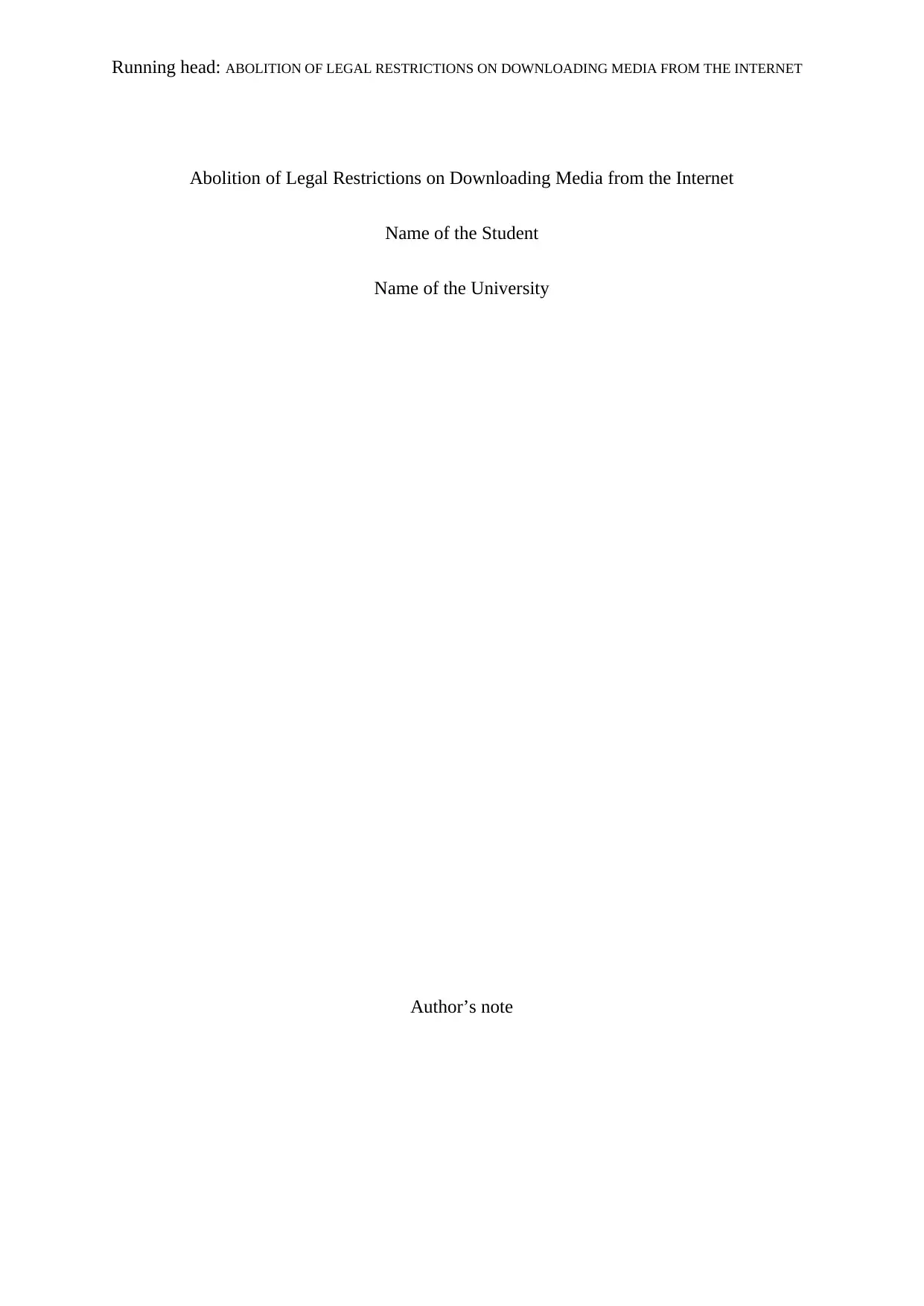
Running head: ABOLITION OF LEGAL RESTRICTIONS ON DOWNLOADING MEDIA FROM THE INTERNET
Abolition of Legal Restrictions on Downloading Media from the Internet
Name of the Student
Name of the University
Author’s note
Abolition of Legal Restrictions on Downloading Media from the Internet
Name of the Student
Name of the University
Author’s note
Paraphrase This Document
Need a fresh take? Get an instant paraphrase of this document with our AI Paraphraser
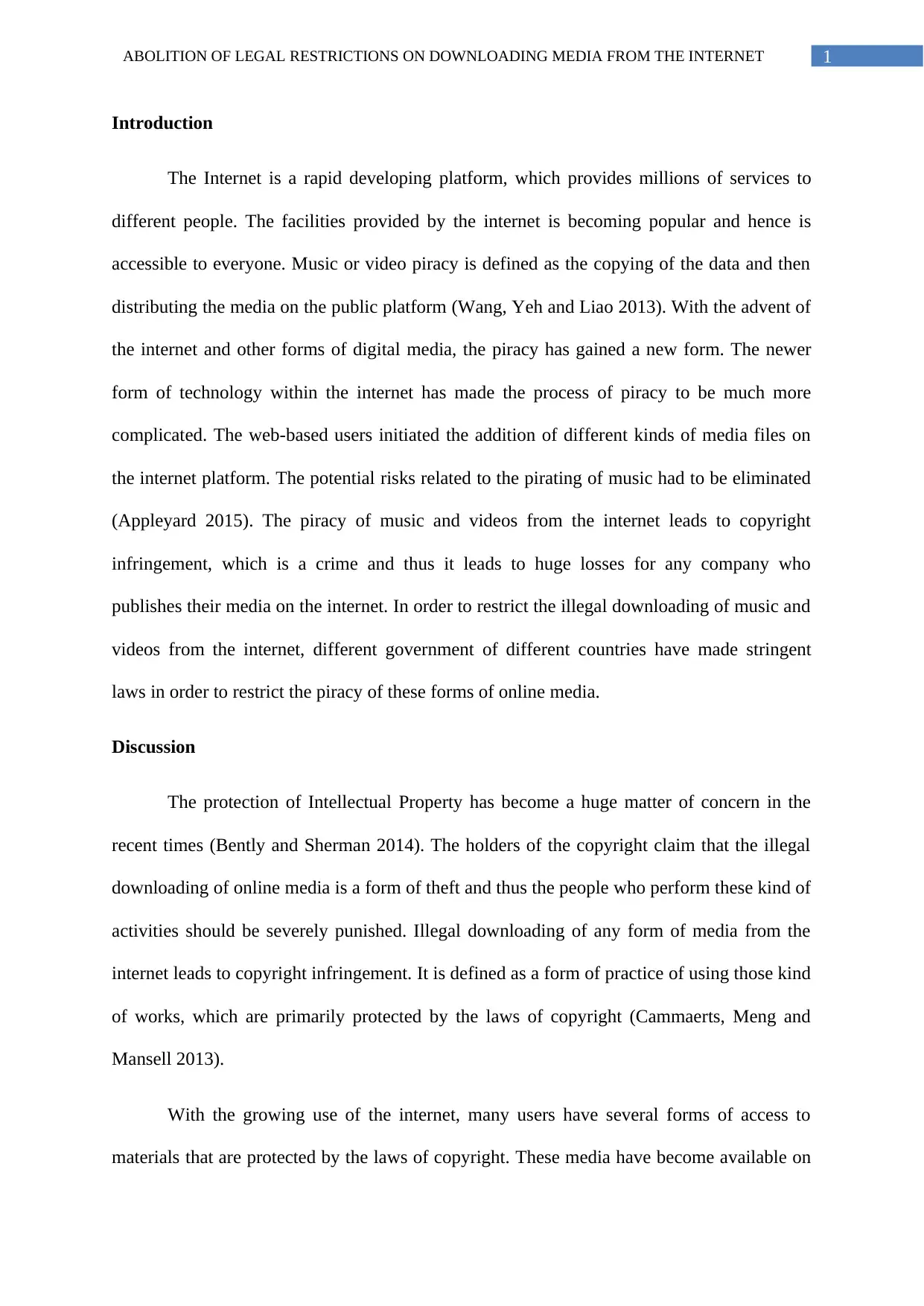
1ABOLITION OF LEGAL RESTRICTIONS ON DOWNLOADING MEDIA FROM THE INTERNET
Introduction
The Internet is a rapid developing platform, which provides millions of services to
different people. The facilities provided by the internet is becoming popular and hence is
accessible to everyone. Music or video piracy is defined as the copying of the data and then
distributing the media on the public platform (Wang, Yeh and Liao 2013). With the advent of
the internet and other forms of digital media, the piracy has gained a new form. The newer
form of technology within the internet has made the process of piracy to be much more
complicated. The web-based users initiated the addition of different kinds of media files on
the internet platform. The potential risks related to the pirating of music had to be eliminated
(Appleyard 2015). The piracy of music and videos from the internet leads to copyright
infringement, which is a crime and thus it leads to huge losses for any company who
publishes their media on the internet. In order to restrict the illegal downloading of music and
videos from the internet, different government of different countries have made stringent
laws in order to restrict the piracy of these forms of online media.
Discussion
The protection of Intellectual Property has become a huge matter of concern in the
recent times (Bently and Sherman 2014). The holders of the copyright claim that the illegal
downloading of online media is a form of theft and thus the people who perform these kind of
activities should be severely punished. Illegal downloading of any form of media from the
internet leads to copyright infringement. It is defined as a form of practice of using those kind
of works, which are primarily protected by the laws of copyright (Cammaerts, Meng and
Mansell 2013).
With the growing use of the internet, many users have several forms of access to
materials that are protected by the laws of copyright. These media have become available on
Introduction
The Internet is a rapid developing platform, which provides millions of services to
different people. The facilities provided by the internet is becoming popular and hence is
accessible to everyone. Music or video piracy is defined as the copying of the data and then
distributing the media on the public platform (Wang, Yeh and Liao 2013). With the advent of
the internet and other forms of digital media, the piracy has gained a new form. The newer
form of technology within the internet has made the process of piracy to be much more
complicated. The web-based users initiated the addition of different kinds of media files on
the internet platform. The potential risks related to the pirating of music had to be eliminated
(Appleyard 2015). The piracy of music and videos from the internet leads to copyright
infringement, which is a crime and thus it leads to huge losses for any company who
publishes their media on the internet. In order to restrict the illegal downloading of music and
videos from the internet, different government of different countries have made stringent
laws in order to restrict the piracy of these forms of online media.
Discussion
The protection of Intellectual Property has become a huge matter of concern in the
recent times (Bently and Sherman 2014). The holders of the copyright claim that the illegal
downloading of online media is a form of theft and thus the people who perform these kind of
activities should be severely punished. Illegal downloading of any form of media from the
internet leads to copyright infringement. It is defined as a form of practice of using those kind
of works, which are primarily protected by the laws of copyright (Cammaerts, Meng and
Mansell 2013).
With the growing use of the internet, many users have several forms of access to
materials that are protected by the laws of copyright. These media have become available on
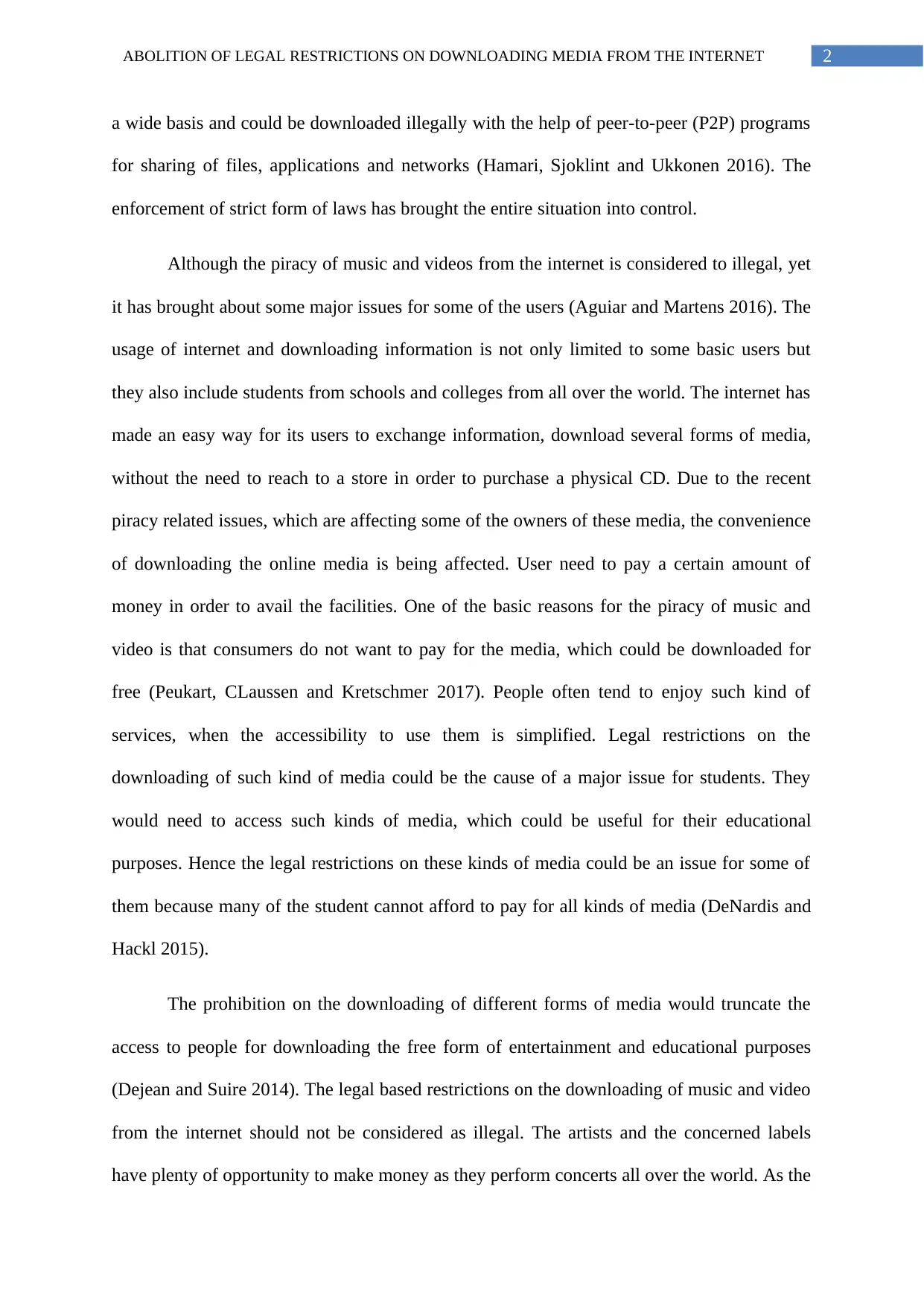
2ABOLITION OF LEGAL RESTRICTIONS ON DOWNLOADING MEDIA FROM THE INTERNET
a wide basis and could be downloaded illegally with the help of peer-to-peer (P2P) programs
for sharing of files, applications and networks (Hamari, Sjoklint and Ukkonen 2016). The
enforcement of strict form of laws has brought the entire situation into control.
Although the piracy of music and videos from the internet is considered to illegal, yet
it has brought about some major issues for some of the users (Aguiar and Martens 2016). The
usage of internet and downloading information is not only limited to some basic users but
they also include students from schools and colleges from all over the world. The internet has
made an easy way for its users to exchange information, download several forms of media,
without the need to reach to a store in order to purchase a physical CD. Due to the recent
piracy related issues, which are affecting some of the owners of these media, the convenience
of downloading the online media is being affected. User need to pay a certain amount of
money in order to avail the facilities. One of the basic reasons for the piracy of music and
video is that consumers do not want to pay for the media, which could be downloaded for
free (Peukart, CLaussen and Kretschmer 2017). People often tend to enjoy such kind of
services, when the accessibility to use them is simplified. Legal restrictions on the
downloading of such kind of media could be the cause of a major issue for students. They
would need to access such kinds of media, which could be useful for their educational
purposes. Hence the legal restrictions on these kinds of media could be an issue for some of
them because many of the student cannot afford to pay for all kinds of media (DeNardis and
Hackl 2015).
The prohibition on the downloading of different forms of media would truncate the
access to people for downloading the free form of entertainment and educational purposes
(Dejean and Suire 2014). The legal based restrictions on the downloading of music and video
from the internet should not be considered as illegal. The artists and the concerned labels
have plenty of opportunity to make money as they perform concerts all over the world. As the
a wide basis and could be downloaded illegally with the help of peer-to-peer (P2P) programs
for sharing of files, applications and networks (Hamari, Sjoklint and Ukkonen 2016). The
enforcement of strict form of laws has brought the entire situation into control.
Although the piracy of music and videos from the internet is considered to illegal, yet
it has brought about some major issues for some of the users (Aguiar and Martens 2016). The
usage of internet and downloading information is not only limited to some basic users but
they also include students from schools and colleges from all over the world. The internet has
made an easy way for its users to exchange information, download several forms of media,
without the need to reach to a store in order to purchase a physical CD. Due to the recent
piracy related issues, which are affecting some of the owners of these media, the convenience
of downloading the online media is being affected. User need to pay a certain amount of
money in order to avail the facilities. One of the basic reasons for the piracy of music and
video is that consumers do not want to pay for the media, which could be downloaded for
free (Peukart, CLaussen and Kretschmer 2017). People often tend to enjoy such kind of
services, when the accessibility to use them is simplified. Legal restrictions on the
downloading of such kind of media could be the cause of a major issue for students. They
would need to access such kinds of media, which could be useful for their educational
purposes. Hence the legal restrictions on these kinds of media could be an issue for some of
them because many of the student cannot afford to pay for all kinds of media (DeNardis and
Hackl 2015).
The prohibition on the downloading of different forms of media would truncate the
access to people for downloading the free form of entertainment and educational purposes
(Dejean and Suire 2014). The legal based restrictions on the downloading of music and video
from the internet should not be considered as illegal. The artists and the concerned labels
have plenty of opportunity to make money as they perform concerts all over the world. As the
⊘ This is a preview!⊘
Do you want full access?
Subscribe today to unlock all pages.

Trusted by 1+ million students worldwide
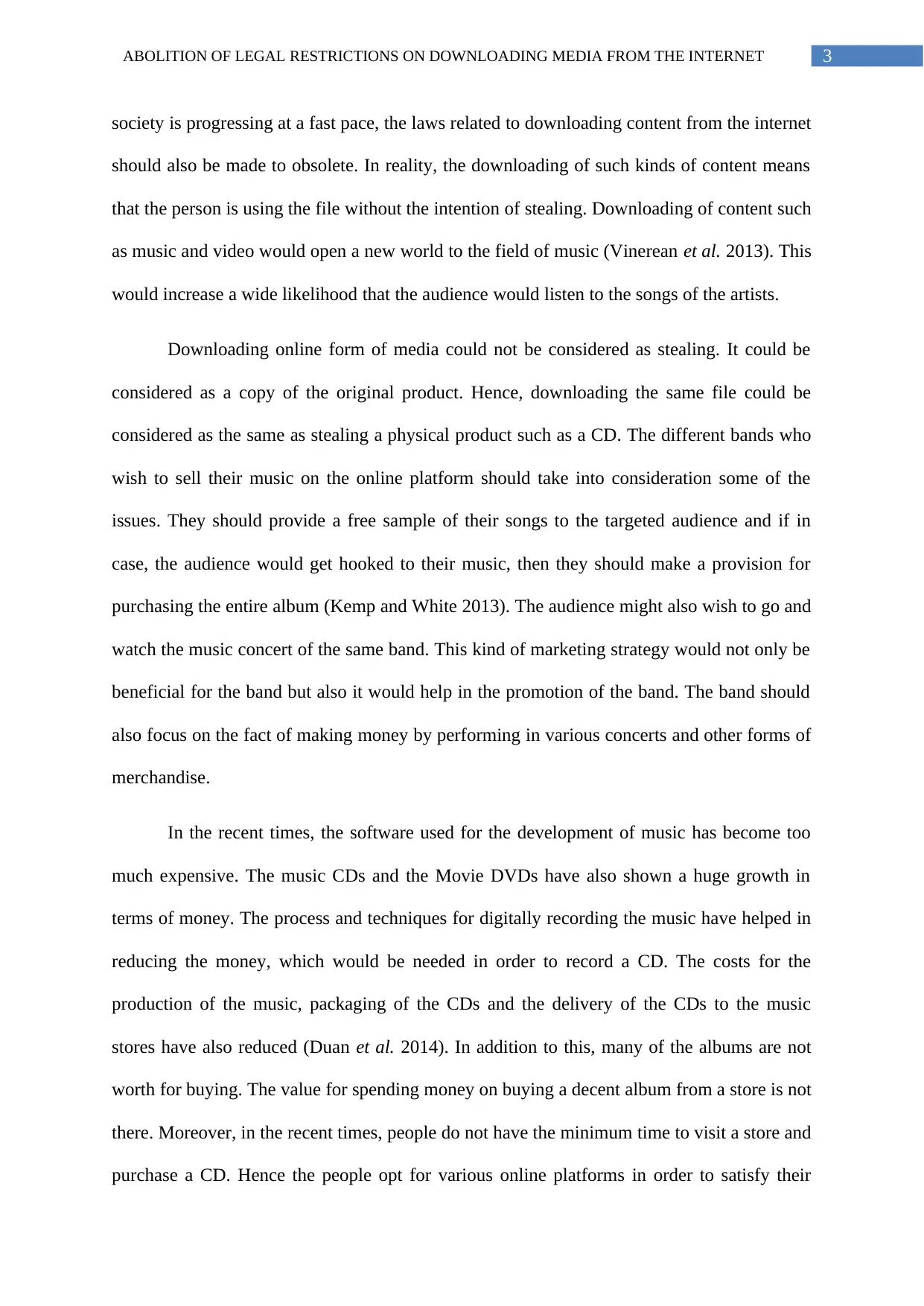
3ABOLITION OF LEGAL RESTRICTIONS ON DOWNLOADING MEDIA FROM THE INTERNET
society is progressing at a fast pace, the laws related to downloading content from the internet
should also be made to obsolete. In reality, the downloading of such kinds of content means
that the person is using the file without the intention of stealing. Downloading of content such
as music and video would open a new world to the field of music (Vinerean et al. 2013). This
would increase a wide likelihood that the audience would listen to the songs of the artists.
Downloading online form of media could not be considered as stealing. It could be
considered as a copy of the original product. Hence, downloading the same file could be
considered as the same as stealing a physical product such as a CD. The different bands who
wish to sell their music on the online platform should take into consideration some of the
issues. They should provide a free sample of their songs to the targeted audience and if in
case, the audience would get hooked to their music, then they should make a provision for
purchasing the entire album (Kemp and White 2013). The audience might also wish to go and
watch the music concert of the same band. This kind of marketing strategy would not only be
beneficial for the band but also it would help in the promotion of the band. The band should
also focus on the fact of making money by performing in various concerts and other forms of
merchandise.
In the recent times, the software used for the development of music has become too
much expensive. The music CDs and the Movie DVDs have also shown a huge growth in
terms of money. The process and techniques for digitally recording the music have helped in
reducing the money, which would be needed in order to record a CD. The costs for the
production of the music, packaging of the CDs and the delivery of the CDs to the music
stores have also reduced (Duan et al. 2014). In addition to this, many of the albums are not
worth for buying. The value for spending money on buying a decent album from a store is not
there. Moreover, in the recent times, people do not have the minimum time to visit a store and
purchase a CD. Hence the people opt for various online platforms in order to satisfy their
society is progressing at a fast pace, the laws related to downloading content from the internet
should also be made to obsolete. In reality, the downloading of such kinds of content means
that the person is using the file without the intention of stealing. Downloading of content such
as music and video would open a new world to the field of music (Vinerean et al. 2013). This
would increase a wide likelihood that the audience would listen to the songs of the artists.
Downloading online form of media could not be considered as stealing. It could be
considered as a copy of the original product. Hence, downloading the same file could be
considered as the same as stealing a physical product such as a CD. The different bands who
wish to sell their music on the online platform should take into consideration some of the
issues. They should provide a free sample of their songs to the targeted audience and if in
case, the audience would get hooked to their music, then they should make a provision for
purchasing the entire album (Kemp and White 2013). The audience might also wish to go and
watch the music concert of the same band. This kind of marketing strategy would not only be
beneficial for the band but also it would help in the promotion of the band. The band should
also focus on the fact of making money by performing in various concerts and other forms of
merchandise.
In the recent times, the software used for the development of music has become too
much expensive. The music CDs and the Movie DVDs have also shown a huge growth in
terms of money. The process and techniques for digitally recording the music have helped in
reducing the money, which would be needed in order to record a CD. The costs for the
production of the music, packaging of the CDs and the delivery of the CDs to the music
stores have also reduced (Duan et al. 2014). In addition to this, many of the albums are not
worth for buying. The value for spending money on buying a decent album from a store is not
there. Moreover, in the recent times, people do not have the minimum time to visit a store and
purchase a CD. Hence the people opt for various online platforms in order to satisfy their
Paraphrase This Document
Need a fresh take? Get an instant paraphrase of this document with our AI Paraphraser
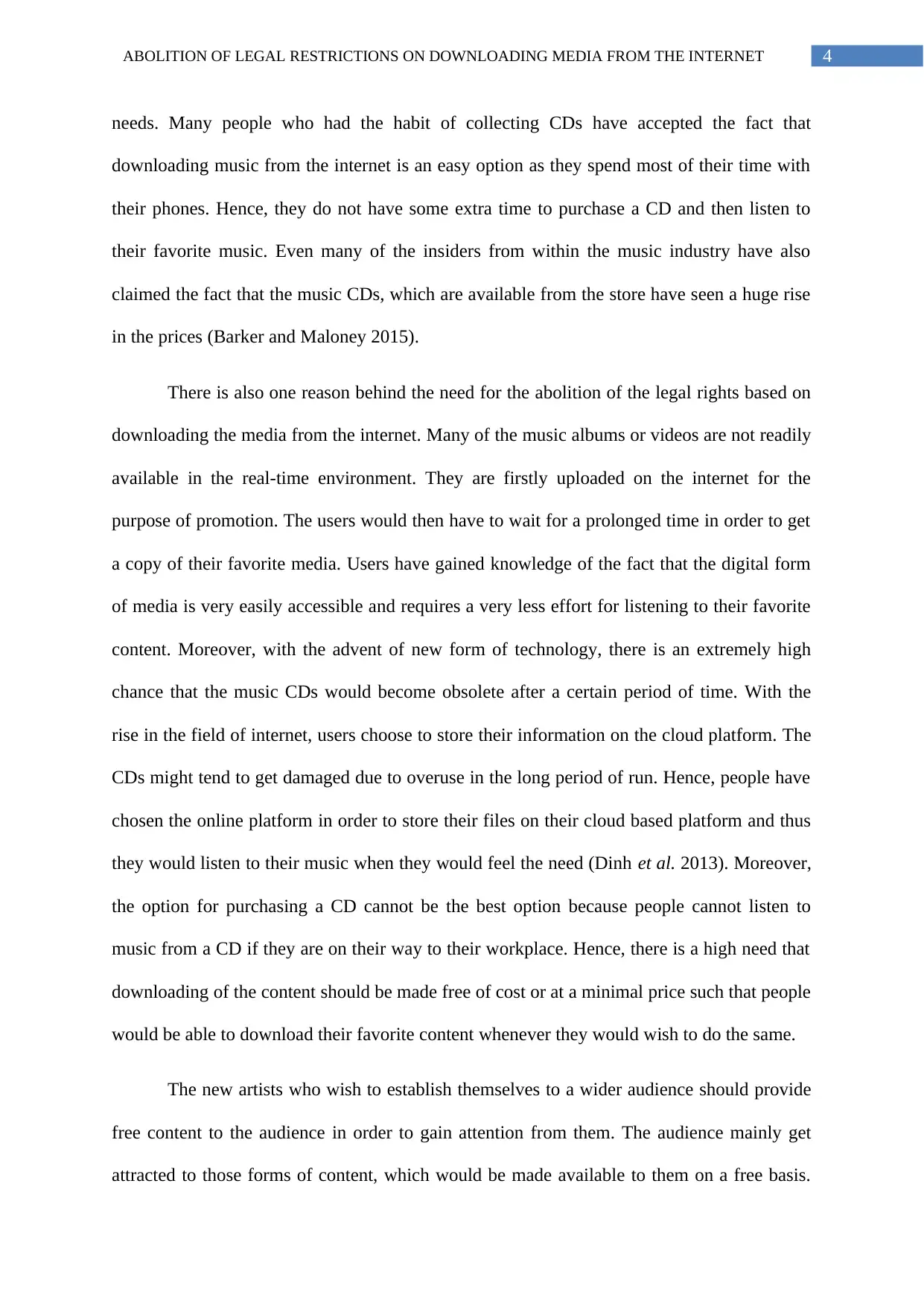
4ABOLITION OF LEGAL RESTRICTIONS ON DOWNLOADING MEDIA FROM THE INTERNET
needs. Many people who had the habit of collecting CDs have accepted the fact that
downloading music from the internet is an easy option as they spend most of their time with
their phones. Hence, they do not have some extra time to purchase a CD and then listen to
their favorite music. Even many of the insiders from within the music industry have also
claimed the fact that the music CDs, which are available from the store have seen a huge rise
in the prices (Barker and Maloney 2015).
There is also one reason behind the need for the abolition of the legal rights based on
downloading the media from the internet. Many of the music albums or videos are not readily
available in the real-time environment. They are firstly uploaded on the internet for the
purpose of promotion. The users would then have to wait for a prolonged time in order to get
a copy of their favorite media. Users have gained knowledge of the fact that the digital form
of media is very easily accessible and requires a very less effort for listening to their favorite
content. Moreover, with the advent of new form of technology, there is an extremely high
chance that the music CDs would become obsolete after a certain period of time. With the
rise in the field of internet, users choose to store their information on the cloud platform. The
CDs might tend to get damaged due to overuse in the long period of run. Hence, people have
chosen the online platform in order to store their files on their cloud based platform and thus
they would listen to their music when they would feel the need (Dinh et al. 2013). Moreover,
the option for purchasing a CD cannot be the best option because people cannot listen to
music from a CD if they are on their way to their workplace. Hence, there is a high need that
downloading of the content should be made free of cost or at a minimal price such that people
would be able to download their favorite content whenever they would wish to do the same.
The new artists who wish to establish themselves to a wider audience should provide
free content to the audience in order to gain attention from them. The audience mainly get
attracted to those forms of content, which would be made available to them on a free basis.
needs. Many people who had the habit of collecting CDs have accepted the fact that
downloading music from the internet is an easy option as they spend most of their time with
their phones. Hence, they do not have some extra time to purchase a CD and then listen to
their favorite music. Even many of the insiders from within the music industry have also
claimed the fact that the music CDs, which are available from the store have seen a huge rise
in the prices (Barker and Maloney 2015).
There is also one reason behind the need for the abolition of the legal rights based on
downloading the media from the internet. Many of the music albums or videos are not readily
available in the real-time environment. They are firstly uploaded on the internet for the
purpose of promotion. The users would then have to wait for a prolonged time in order to get
a copy of their favorite media. Users have gained knowledge of the fact that the digital form
of media is very easily accessible and requires a very less effort for listening to their favorite
content. Moreover, with the advent of new form of technology, there is an extremely high
chance that the music CDs would become obsolete after a certain period of time. With the
rise in the field of internet, users choose to store their information on the cloud platform. The
CDs might tend to get damaged due to overuse in the long period of run. Hence, people have
chosen the online platform in order to store their files on their cloud based platform and thus
they would listen to their music when they would feel the need (Dinh et al. 2013). Moreover,
the option for purchasing a CD cannot be the best option because people cannot listen to
music from a CD if they are on their way to their workplace. Hence, there is a high need that
downloading of the content should be made free of cost or at a minimal price such that people
would be able to download their favorite content whenever they would wish to do the same.
The new artists who wish to establish themselves to a wider audience should provide
free content to the audience in order to gain attention from them. The audience mainly get
attracted to those forms of content, which would be made available to them on a free basis.
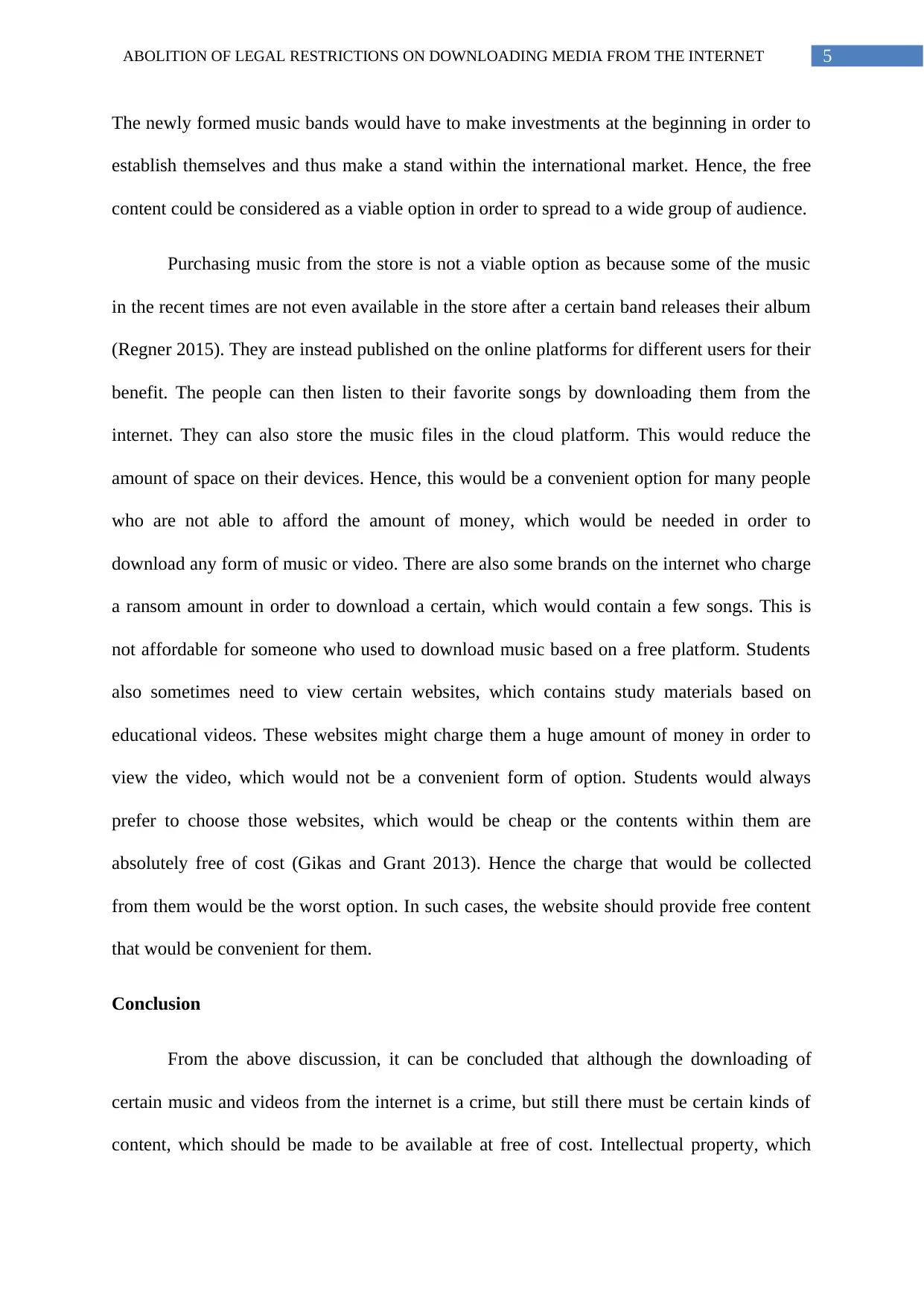
5ABOLITION OF LEGAL RESTRICTIONS ON DOWNLOADING MEDIA FROM THE INTERNET
The newly formed music bands would have to make investments at the beginning in order to
establish themselves and thus make a stand within the international market. Hence, the free
content could be considered as a viable option in order to spread to a wide group of audience.
Purchasing music from the store is not a viable option as because some of the music
in the recent times are not even available in the store after a certain band releases their album
(Regner 2015). They are instead published on the online platforms for different users for their
benefit. The people can then listen to their favorite songs by downloading them from the
internet. They can also store the music files in the cloud platform. This would reduce the
amount of space on their devices. Hence, this would be a convenient option for many people
who are not able to afford the amount of money, which would be needed in order to
download any form of music or video. There are also some brands on the internet who charge
a ransom amount in order to download a certain, which would contain a few songs. This is
not affordable for someone who used to download music based on a free platform. Students
also sometimes need to view certain websites, which contains study materials based on
educational videos. These websites might charge them a huge amount of money in order to
view the video, which would not be a convenient form of option. Students would always
prefer to choose those websites, which would be cheap or the contents within them are
absolutely free of cost (Gikas and Grant 2013). Hence the charge that would be collected
from them would be the worst option. In such cases, the website should provide free content
that would be convenient for them.
Conclusion
From the above discussion, it can be concluded that although the downloading of
certain music and videos from the internet is a crime, but still there must be certain kinds of
content, which should be made to be available at free of cost. Intellectual property, which
The newly formed music bands would have to make investments at the beginning in order to
establish themselves and thus make a stand within the international market. Hence, the free
content could be considered as a viable option in order to spread to a wide group of audience.
Purchasing music from the store is not a viable option as because some of the music
in the recent times are not even available in the store after a certain band releases their album
(Regner 2015). They are instead published on the online platforms for different users for their
benefit. The people can then listen to their favorite songs by downloading them from the
internet. They can also store the music files in the cloud platform. This would reduce the
amount of space on their devices. Hence, this would be a convenient option for many people
who are not able to afford the amount of money, which would be needed in order to
download any form of music or video. There are also some brands on the internet who charge
a ransom amount in order to download a certain, which would contain a few songs. This is
not affordable for someone who used to download music based on a free platform. Students
also sometimes need to view certain websites, which contains study materials based on
educational videos. These websites might charge them a huge amount of money in order to
view the video, which would not be a convenient form of option. Students would always
prefer to choose those websites, which would be cheap or the contents within them are
absolutely free of cost (Gikas and Grant 2013). Hence the charge that would be collected
from them would be the worst option. In such cases, the website should provide free content
that would be convenient for them.
Conclusion
From the above discussion, it can be concluded that although the downloading of
certain music and videos from the internet is a crime, but still there must be certain kinds of
content, which should be made to be available at free of cost. Intellectual property, which
⊘ This is a preview!⊘
Do you want full access?
Subscribe today to unlock all pages.

Trusted by 1+ million students worldwide
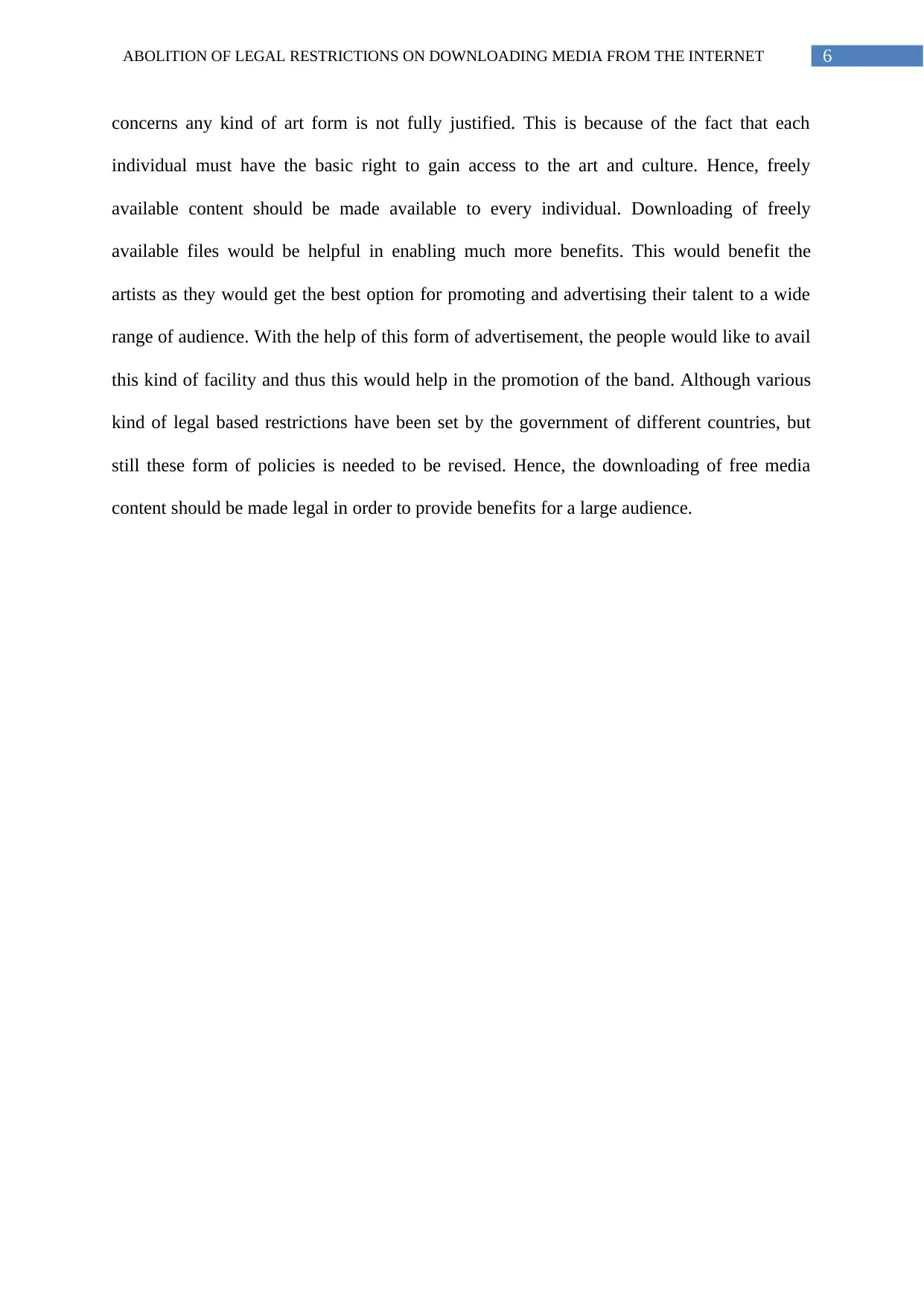
6ABOLITION OF LEGAL RESTRICTIONS ON DOWNLOADING MEDIA FROM THE INTERNET
concerns any kind of art form is not fully justified. This is because of the fact that each
individual must have the basic right to gain access to the art and culture. Hence, freely
available content should be made available to every individual. Downloading of freely
available files would be helpful in enabling much more benefits. This would benefit the
artists as they would get the best option for promoting and advertising their talent to a wide
range of audience. With the help of this form of advertisement, the people would like to avail
this kind of facility and thus this would help in the promotion of the band. Although various
kind of legal based restrictions have been set by the government of different countries, but
still these form of policies is needed to be revised. Hence, the downloading of free media
content should be made legal in order to provide benefits for a large audience.
concerns any kind of art form is not fully justified. This is because of the fact that each
individual must have the basic right to gain access to the art and culture. Hence, freely
available content should be made available to every individual. Downloading of freely
available files would be helpful in enabling much more benefits. This would benefit the
artists as they would get the best option for promoting and advertising their talent to a wide
range of audience. With the help of this form of advertisement, the people would like to avail
this kind of facility and thus this would help in the promotion of the band. Although various
kind of legal based restrictions have been set by the government of different countries, but
still these form of policies is needed to be revised. Hence, the downloading of free media
content should be made legal in order to provide benefits for a large audience.
Paraphrase This Document
Need a fresh take? Get an instant paraphrase of this document with our AI Paraphraser
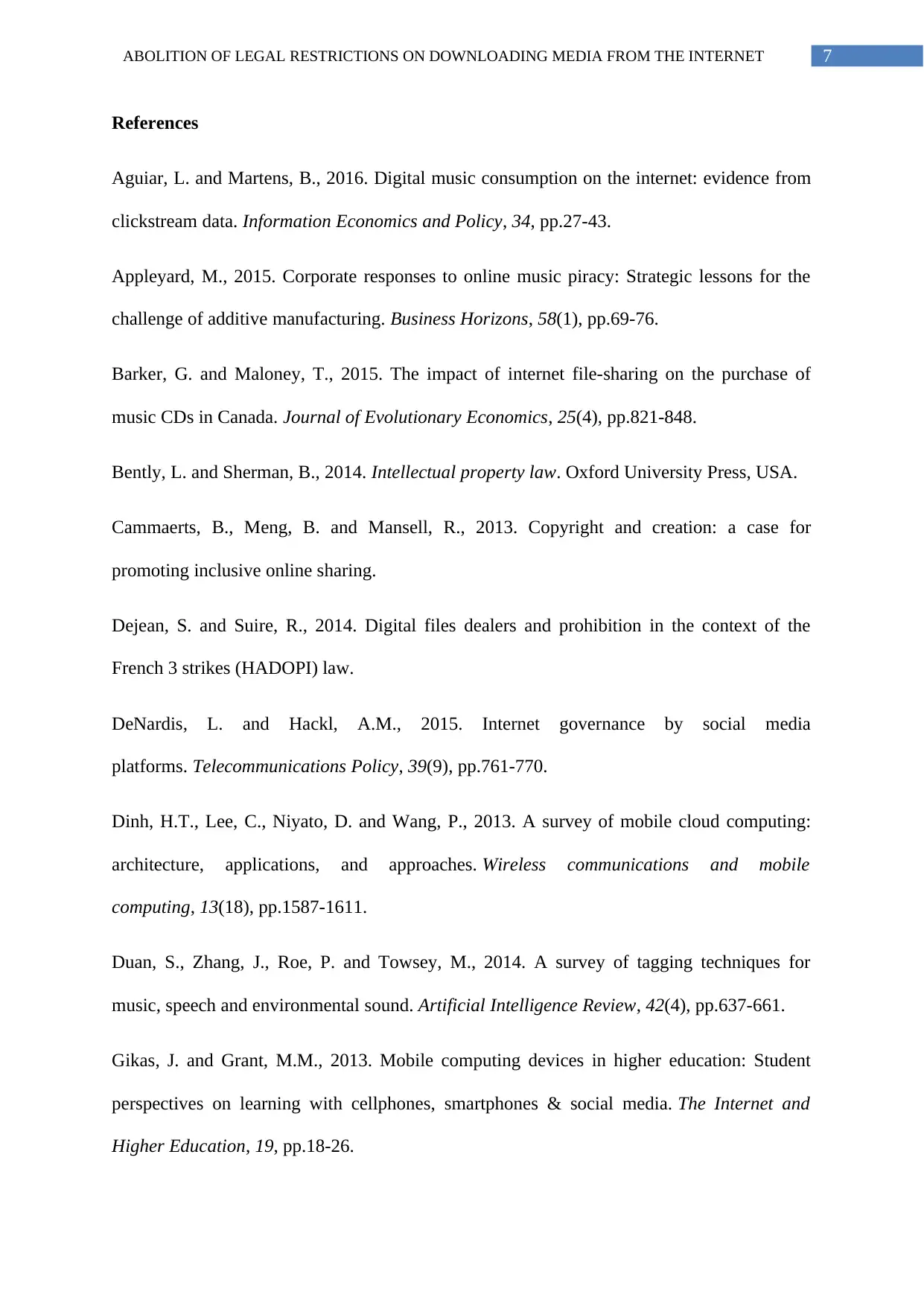
7ABOLITION OF LEGAL RESTRICTIONS ON DOWNLOADING MEDIA FROM THE INTERNET
References
Aguiar, L. and Martens, B., 2016. Digital music consumption on the internet: evidence from
clickstream data. Information Economics and Policy, 34, pp.27-43.
Appleyard, M., 2015. Corporate responses to online music piracy: Strategic lessons for the
challenge of additive manufacturing. Business Horizons, 58(1), pp.69-76.
Barker, G. and Maloney, T., 2015. The impact of internet file-sharing on the purchase of
music CDs in Canada. Journal of Evolutionary Economics, 25(4), pp.821-848.
Bently, L. and Sherman, B., 2014. Intellectual property law. Oxford University Press, USA.
Cammaerts, B., Meng, B. and Mansell, R., 2013. Copyright and creation: a case for
promoting inclusive online sharing.
Dejean, S. and Suire, R., 2014. Digital files dealers and prohibition in the context of the
French 3 strikes (HADOPI) law.
DeNardis, L. and Hackl, A.M., 2015. Internet governance by social media
platforms. Telecommunications Policy, 39(9), pp.761-770.
Dinh, H.T., Lee, C., Niyato, D. and Wang, P., 2013. A survey of mobile cloud computing:
architecture, applications, and approaches. Wireless communications and mobile
computing, 13(18), pp.1587-1611.
Duan, S., Zhang, J., Roe, P. and Towsey, M., 2014. A survey of tagging techniques for
music, speech and environmental sound. Artificial Intelligence Review, 42(4), pp.637-661.
Gikas, J. and Grant, M.M., 2013. Mobile computing devices in higher education: Student
perspectives on learning with cellphones, smartphones & social media. The Internet and
Higher Education, 19, pp.18-26.
References
Aguiar, L. and Martens, B., 2016. Digital music consumption on the internet: evidence from
clickstream data. Information Economics and Policy, 34, pp.27-43.
Appleyard, M., 2015. Corporate responses to online music piracy: Strategic lessons for the
challenge of additive manufacturing. Business Horizons, 58(1), pp.69-76.
Barker, G. and Maloney, T., 2015. The impact of internet file-sharing on the purchase of
music CDs in Canada. Journal of Evolutionary Economics, 25(4), pp.821-848.
Bently, L. and Sherman, B., 2014. Intellectual property law. Oxford University Press, USA.
Cammaerts, B., Meng, B. and Mansell, R., 2013. Copyright and creation: a case for
promoting inclusive online sharing.
Dejean, S. and Suire, R., 2014. Digital files dealers and prohibition in the context of the
French 3 strikes (HADOPI) law.
DeNardis, L. and Hackl, A.M., 2015. Internet governance by social media
platforms. Telecommunications Policy, 39(9), pp.761-770.
Dinh, H.T., Lee, C., Niyato, D. and Wang, P., 2013. A survey of mobile cloud computing:
architecture, applications, and approaches. Wireless communications and mobile
computing, 13(18), pp.1587-1611.
Duan, S., Zhang, J., Roe, P. and Towsey, M., 2014. A survey of tagging techniques for
music, speech and environmental sound. Artificial Intelligence Review, 42(4), pp.637-661.
Gikas, J. and Grant, M.M., 2013. Mobile computing devices in higher education: Student
perspectives on learning with cellphones, smartphones & social media. The Internet and
Higher Education, 19, pp.18-26.
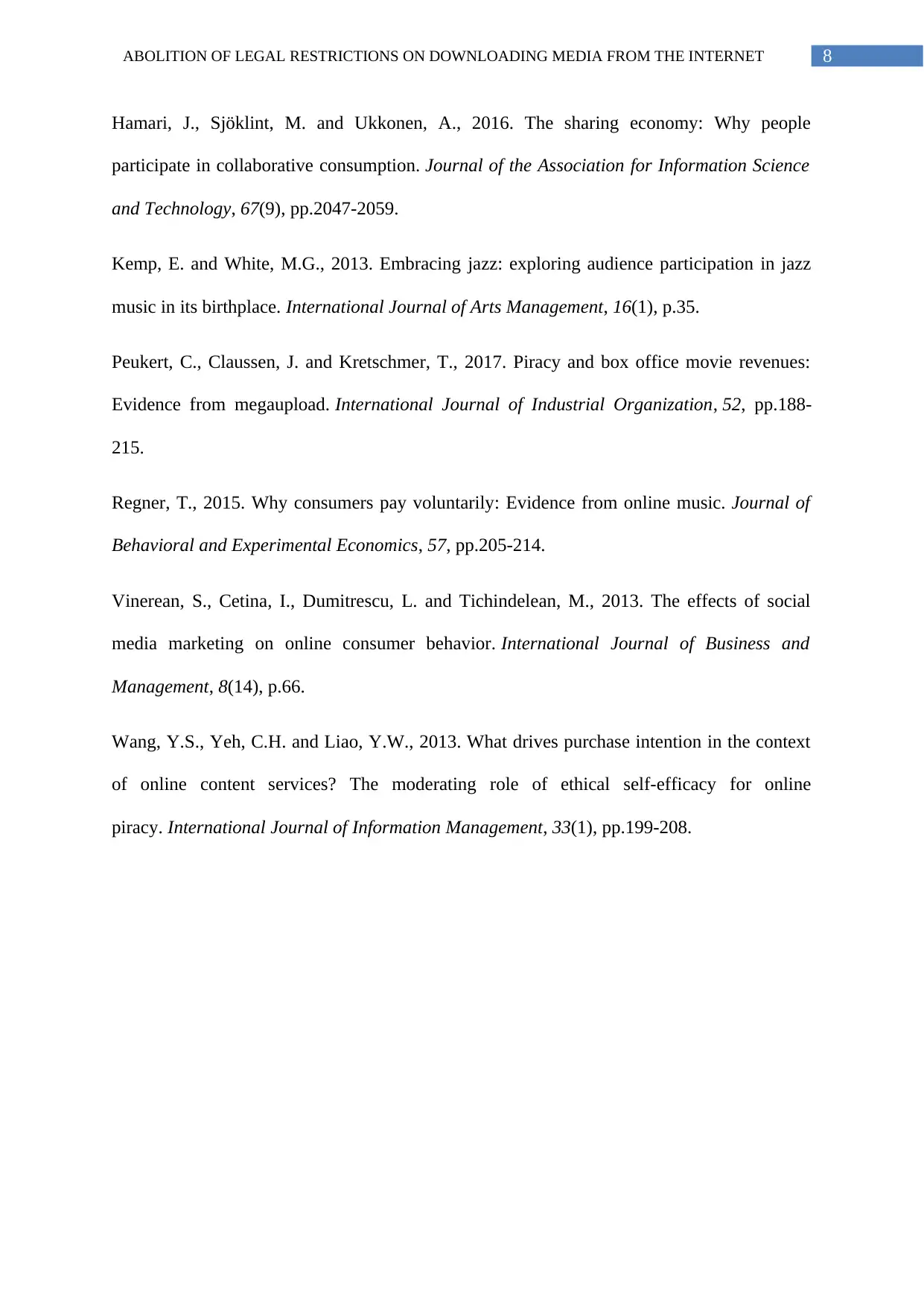
8ABOLITION OF LEGAL RESTRICTIONS ON DOWNLOADING MEDIA FROM THE INTERNET
Hamari, J., Sjöklint, M. and Ukkonen, A., 2016. The sharing economy: Why people
participate in collaborative consumption. Journal of the Association for Information Science
and Technology, 67(9), pp.2047-2059.
Kemp, E. and White, M.G., 2013. Embracing jazz: exploring audience participation in jazz
music in its birthplace. International Journal of Arts Management, 16(1), p.35.
Peukert, C., Claussen, J. and Kretschmer, T., 2017. Piracy and box office movie revenues:
Evidence from megaupload. International Journal of Industrial Organization, 52, pp.188-
215.
Regner, T., 2015. Why consumers pay voluntarily: Evidence from online music. Journal of
Behavioral and Experimental Economics, 57, pp.205-214.
Vinerean, S., Cetina, I., Dumitrescu, L. and Tichindelean, M., 2013. The effects of social
media marketing on online consumer behavior. International Journal of Business and
Management, 8(14), p.66.
Wang, Y.S., Yeh, C.H. and Liao, Y.W., 2013. What drives purchase intention in the context
of online content services? The moderating role of ethical self-efficacy for online
piracy. International Journal of Information Management, 33(1), pp.199-208.
Hamari, J., Sjöklint, M. and Ukkonen, A., 2016. The sharing economy: Why people
participate in collaborative consumption. Journal of the Association for Information Science
and Technology, 67(9), pp.2047-2059.
Kemp, E. and White, M.G., 2013. Embracing jazz: exploring audience participation in jazz
music in its birthplace. International Journal of Arts Management, 16(1), p.35.
Peukert, C., Claussen, J. and Kretschmer, T., 2017. Piracy and box office movie revenues:
Evidence from megaupload. International Journal of Industrial Organization, 52, pp.188-
215.
Regner, T., 2015. Why consumers pay voluntarily: Evidence from online music. Journal of
Behavioral and Experimental Economics, 57, pp.205-214.
Vinerean, S., Cetina, I., Dumitrescu, L. and Tichindelean, M., 2013. The effects of social
media marketing on online consumer behavior. International Journal of Business and
Management, 8(14), p.66.
Wang, Y.S., Yeh, C.H. and Liao, Y.W., 2013. What drives purchase intention in the context
of online content services? The moderating role of ethical self-efficacy for online
piracy. International Journal of Information Management, 33(1), pp.199-208.
⊘ This is a preview!⊘
Do you want full access?
Subscribe today to unlock all pages.

Trusted by 1+ million students worldwide
1 out of 9
Related Documents
Your All-in-One AI-Powered Toolkit for Academic Success.
+13062052269
info@desklib.com
Available 24*7 on WhatsApp / Email
![[object Object]](/_next/static/media/star-bottom.7253800d.svg)
Unlock your academic potential
Copyright © 2020–2026 A2Z Services. All Rights Reserved. Developed and managed by ZUCOL.





